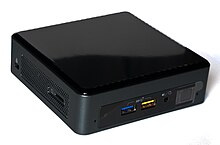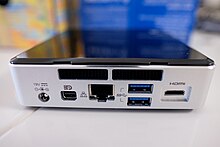Next Unit of Computing
Previewed in 2012 and launched in early 2013,[1] the NUC line continues to develop over generations of Intel-based CPU launches, spanning from Sandy Bridge-based Celeron CPUs in the first generation, to Raptor Lake-based mobile and desktop CPUs in the thirteenth, and more recently Meteor Lake-based processors with AI capabilities.
[2] The standard barebone kits consist of the NUC board, in a plastic case with a fan, an external power supply, and a VESA mounting plate.
[8] They subsequently announced that NUC products will continue to be manufactured, sold and supported by ASUS under a non-exclusive license.
The base UCFF motherboard and kit without Thunderbolt or USB 3 are codenamed Golden Lake (D33217GK) and Ice Canyon (DC3217IY) respectively.
BIOS revision 48 has been released and resolved the problems, enabling the recognition of most low voltage SO-DIMMs, keyboard escapes and legacy booting.
UCFF motherboard (D34010WYB and D54250WYB) and system kit (D34010WYK/D34010WYKH and D54250WYK/D54250WYKH) models were designated Wilson Canyon[13][14] containing Haswell processors were revealed in June 2013.
Intel seventh generation NUC models, codenamed Baby Canyon, are based on their Kaby Lake-U processors.
A Fanless chassis was designed by Simply NUC, Inc. of Round Rock, Texas for the Dawson Canyon motherboards.
Note: NUC7i7DNFE was sometimes referred to as NUC8i7DNFE due to using a Gen 8 Kaby Lake Refresh processor The UCFF system kit (NUC7PJYH and NUC7CJYH) models, codenamed June Canyon, based on 7th generation Pentium & Celeron-branded Gemini Lake SoC 14 nm processor family.
Max memory supported stated in BIOS dmidecode is: Intel eighth generation NUC models, codenamed Hades Canyon, is based on their Kaby Lake-G processors with a TDP from 65 W to 100 W. It features a custom AMD GPU, based on Vega and Polaris technologies.
Intel eighth generation NUC models, codenamed Bean Canyon, is based on their Coffee Lake-U processors with a TDP of 28 W.[23] They were launched in Q3/2018.
Intel eighth generation NUC models, codenamed Crimson Canyon, is based on their 10 nm Cannon Lake-U processors.
Intel eighth generation NUC models, codenamed Islay Canyon, is based on their Whiskey Lake-U processors with a TDP of 15 W.[23] They were launched in Q2/2019.
[36] Fully configured NUC 11 Performance Mini PCs featured a wireless charging lid as noted by the letter "Q" in the model name.
The PC was targeted towards gamers with its compact modular chassis, support for full-sized discrete graphics cards, desktop CPU, and replaceable RGB-lit skull logo.
The UCFF system kit (NUC11ATKPE and NUC11ATKC4) models, codenamed Atlas Canyon, based on Pentium Silver & Celeron-branded Jasper Lake SoC 10 nm processor family.
The small form factor NUC 12 Extreme kit, codenamed Dragon Canyon,[38] comes with 12th generation Intel CPUs and designed to fit a 2-slot wide discrete graphics card via PCIe add-in.
The NUC 12 Enthusiast, codenamed Serpent Canyon, was released in late Q3 2022 and features the Alder Lake-H Core i7-12700H processor with Intel Arc A770M Graphics and 16 GB GDDR6 VRAM.
The NUC 13 Extreme Kit featured a larger chassis than past iterations, allowing for full-sized 3-slot discrete graphics card such as the GeForce RTX 4090 to be installed.
The 14th generation of NUC models, codenamed Revel Canyon, are based on Intel's Series 1 Core Ultra processors.
[45] The NUC can also be seen as an extension or continuation of Intel's earlier mobile-on-desktop (MoDT) initiative that was spearheaded by AOpen as early as 2004.
Silent PC Review notes that “The original Intel NUC had "the distinction of being the quietest fan-cooled mini-computer we've come across."
In normal use, you can't hear the fan until your ear is inches from the unit.”[52] Nevertheless, passively cooled third-party cases have appeared on the market as well.
For example, Gigabyte Technology launched their BRIX series, which attempts to differentiate itself using more powerful components, up to the i7-4770R processor, which embeds Intel Iris Pro Graphics.
Additionally, they can be used for virtualization with a variety of different hypervisor hosts; multiple NUCs can be used together to create a home lab for learning purposes.








